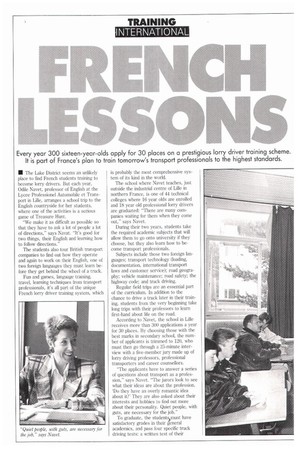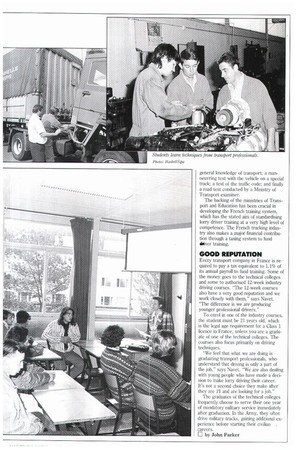TRAINING INTERNATIONAL
Page 38

Page 39

If you've noticed an error in this article please click here to report it so we can fix it.
• The Lake District seems an unlikely place to find French students training to become lorry drivers. But each year, Odile Navet, professor of English at the Lycee Professionel Automobile et Transport in Lille, arranges a school trip to the English countryside for her students, where one of the activities is a serious game of Treasure Hunt.
"We make it as difficult as possible so that they have to ask a lot of people a lot of directions," says Navat. "It's good for two things, their English and learning how to follow directions."
The students also tour British transport companies to find out how they operate and again to work on their English, one of two foreign languages they must learn before they get behind the wheel of a truck.
Fun and games, language training, travel, learning techniques from transport professionals, it's all part of the unique French lorry driver training system, which is probably the most comprehensive system of its kind in the world.
The school where Navet teaches, just outside the industrial centre of Lille in northern France, is one of 44 technical colleges where 16 year olds are enrolled and 18 year old professional lorry drivers are graduated: "There are many companies waiting for them when they come out," says Navet.
During their two years, students take the required academic subjects that will allow them to go onto university if they choose, but they also learn how to become transport professionals.
Subjects include those two foreign languages; transport technology (loading, documentation, international transport laws and customer service); road geography; vehicle maintenance; road safety; the highway code; and truck driving.
Regular field trips are an essential part of the curriculum. In addition to the chance to drive a truck later in their training, students from the very beginning take long trips with their professors to learn first-hand about life on the road.
According to Navet, the school in Lille receives more than 300 applications a year for 30 places. By choosing those with the best marks in secondary school, the number of applicants is trimmed to 120, who must then go through a 25-minute interview with a five-member jury made up of lorry driving professors, professional transporters and career counsellors.
"The applicants have to answer a series of questions about transport as a profession," says Navet. '"I'he jurors look to see what their ideas are about the profession. 'Do they have an overly romantic idea about it?' They are also asked about their interests and hobbies to find out more about their personality. Quiet people, with guts, are necessary for the job."
To graduate, the students)must have satisfactory grades in their general academics, and pass four specific truck driving tests: a written test of their
general knowledge of transport; a manoeuvring test with the vehicle on a special track; a test of the traffic code; and finally a road test conducted by a Ministry of Transport examiner.
The backing of the ministries of Transport and Education has been crucial in developing the French training system, which has the stated aim of standardising lorry driver training at a very high level of competence. The French trucking industry also makes a major financial contribution through a taxing system to fund Myer training.
Every transport company in France is required to pay a tax equivalent to 1.1% of its annual payroll to fund training. Some of the money goes to the technical colleges and some to authorised 12-week industry driving courses. "The 12-week courses also have a very good reputation and we work closely with them," says Navet. "The difference is we are producing younger professional drivers."
To enrol in one of the industry courses, the student must be 21 years old, which is the legal age requirement for a Class 1 licence in France, unless you are a graduate of one of the technical colleges. The courses also focus primarily on driving techniques.
"We feel that what we are doing is graduating transport professionals, who understand that driving is only a part of the job," says Navet. "We are also dealing with young people who have made a decision to make lorry driving their career. It's not a second choice they make after they are 21 and are looking for a job."
The graduates of the technical colleges frequently choose to serve their one year of mandatory military service immediately after graduation. In the Army, they often drive military trucks, gaining additional experience before starting their civilian careers.
by John Parker




































































































